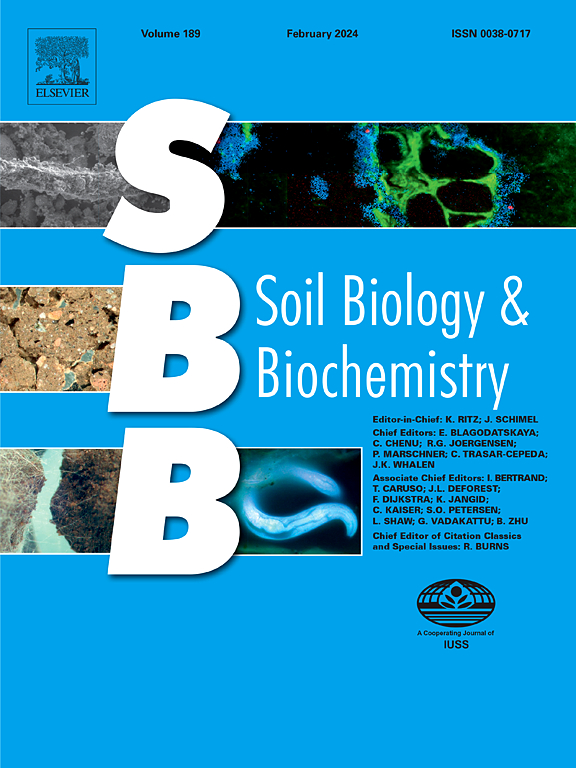Microbial death in the Andes: necromass declines despite growth and carbon-use-efficiency increases with decadal soil warming
IF 10.3
1区 农林科学
Q1 SOIL SCIENCE
引用次数: 0
Abstract
The growth and death of soil microbes are important drivers of soil carbon formation. A warming climate is predicted to affect both the production of microbial biomass and the stability of microbial residues (necromass) held in soils. However, we have very little information on how warming in tropical soils will affect these processes, and on the effect of temperature on microbial production and turnover over different time-scales. To address this, we studied temperature effects on microbial-mediated C cycling across two different time-scales, using a 20 °C mean annual temperature gradient in the Peruvian Andes (long-term effects) and decadal experimental-warming via soil translocation (11-years of temperature effects). At long-term timescales, a legacy of warmer temperatures decreased microbial carbon use efficiency (CUE), microbial biomass C, and decreased fungal and bacterial necromass concentration in soils. At decadal timescales, experimental warming increased CUE, microbial production and microbial biomass concentration (likely the result of concomitant changes in substrate availability). However, this did not translate into increased microbial necromass concentration, which generally declined with warming across all temporal scales. Together, we show that warmer temperatures over decadal (11-year) timescales affect soil microbial processes to potentially increase their C input to soil (increased CUE, microbial production, and biomass) but we find no evidence that this C became stabilized as the necromass C pool decreased. Our results indicate that warming can alter microbial community metabolism to potentially increase necromass C inputs to soil, although we find no evidence to show that this offset overall soil C loss with warming.安第斯山脉的微生物死亡:尽管生长和碳利用效率随着土壤年代际变暖而增加,但坏死块仍在减少
土壤微生物的生长和死亡是土壤碳形成的重要驱动因素。预计气候变暖将影响微生物生物量的产生和土壤中微生物残留物(坏死物)的稳定性。然而,关于热带土壤变暖将如何影响这些过程,以及不同时间尺度上温度对微生物生产和周转的影响,我们知之甚少。为了解决这个问题,我们在两个不同的时间尺度上研究了温度对微生物介导的碳循环的影响,使用了秘鲁安第斯山脉20°C的年平均温度梯度(长期影响)和通过土壤易位产生的十年代际实验变暖(11年的温度影响)。在长期时间尺度上,温度升高降低了土壤中微生物碳利用效率(CUE)、微生物生物量C,并降低了真菌和细菌的坏死团浓度。在年代际时间尺度上,实验变暖增加了CUE、微生物产量和微生物生物量浓度(可能是伴随基质有效性变化的结果)。然而,这并没有转化为微生物坏死团浓度的增加,在所有时间尺度上,微生物坏死团浓度通常随着变暖而下降。总之,我们发现,在十年(11年)的时间尺度上,温度升高会影响土壤微生物过程,从而潜在地增加它们对土壤的碳输入(增加CUE、微生物产量和生物量),但我们没有发现证据表明,随着坏死体碳库的减少,这些碳会趋于稳定。我们的研究结果表明,变暖可以改变微生物群落的代谢,从而潜在地增加土壤中的坏死体碳输入,尽管我们没有发现证据表明这抵消了变暖带来的总体土壤碳损失。
本文章由计算机程序翻译,如有差异,请以英文原文为准。
求助全文
约1分钟内获得全文
求助全文
来源期刊

Soil Biology & Biochemistry
农林科学-土壤科学
CiteScore
16.90
自引率
9.30%
发文量
312
审稿时长
49 days
期刊介绍:
Soil Biology & Biochemistry publishes original research articles of international significance focusing on biological processes in soil and their applications to soil and environmental quality. Major topics include the ecology and biochemical processes of soil organisms, their effects on the environment, and interactions with plants. The journal also welcomes state-of-the-art reviews and discussions on contemporary research in soil biology and biochemistry.
 求助内容:
求助内容: 应助结果提醒方式:
应助结果提醒方式:


